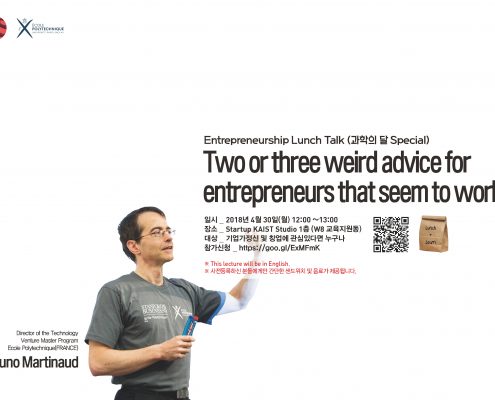test

A lecture on the emerging technologies of blockchains and cryptocurrencies and their applications was held in the Educational Support Building (W8) on May 29. The event was jointly organized by KAIST club Signal and startup company BlockOdyssey. The lecture, titled “The Present and Future of Blockchains and Cryptocurrencies”, was delivered by KAIST School of Electrical Engineering graduate Jinwoo Park representing Hashed, South Korea’s largest cryptocurrency fund.
As an introduction, a representative from Signal and BlockOdyssey gave a brief description of each organization. Signal is a blockchain startup club from KAIST and BlockOdyssey is an active company in the field of blockchain technologies founded by Signal members. BlockOdyssey values decentralization and attempts to utilize blockchains without wasting resources. Currently, it is working with AmorePacific to tackle the practical problem of authentication against counterfeit products.
Hashed Chief Software Architect and Partner Jinwoo Park asserted that blockchain technologies have the potential to solve many problems pertinent to modern capitalism. Centralization and dependence on authority can pose problems, especially in developing countries with high unbanked populations. The double spending problem — the problem of ensuring that digital currency cannot be spent multiple times — was addressed with the invention of Bitcoin. Furthermore, with the development of Ethereum smart contracts, blockchain technology made it possible to have reliable transactions without the requirement of middleman intervention. With cryptocurrencies gaining more mainstream appeal, a recent trend for established companies is to undergo “reverse ICOs”, the decentralizing and tokenizing of the previously existing aspects of business to raise funds. Park described the modern business structure of maximizing shareholder profits as an outdated tradition and anticipated that further advancements and applications of blockchain technology can revolutionize companies into a modernized, cooperative system.
The talk was followed by a Q&A session discussing different cryptocurrencies and recruitment information. Questions on finding good cryptocurrency projects, networking between developers, and political considerations on cryptocurrencies were discussed. The event represented an opportunity for KAIST students to gain insights into a hotly emerging topic by listening to the optimistic and ambitious opinions of an alumnus in the field.

